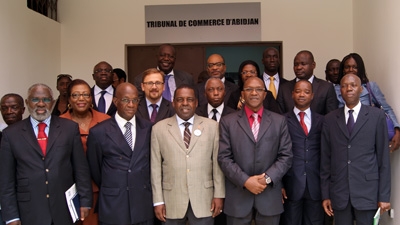ABIDJAN, June 19, 2013_ Following the post-electoral crisis that shook the country in late 2010, the Ivoirian authorities had no other choice than to rethink their strategy to win back investors who had shunned Côte d’Ivoire’s political and social instability for more than a decade.
The crisis took a particularly heavy toll on small and medium-sized enterprises (SMEs). With SMEs forced to shut up shop between 2002 and 2010thousands of people were put out of work. In November 2009, the World Bank awarded a US $15 million grant for the Small and Medium Enterprise (SME) Revitalization and Governance Project (PARE-PME) but the project was shelved for six months when the post-electoral crisis broke out in November 2010.
Supporting small businesses
Côte d’Ivoire is hardly proud of its 177th position in the latest edition of Doing Business (which ranks countries by ease of doing business). During a recent meeting with the working group on improving Côte d’Ivoire’s business climate, Prime Minister Daniel Kablan Duncan called his country’s unviable ranking “unacceptable.”
A few weeks after this meeting, Madani Tall, the World Bank’s Country Director for Côte d’Ivoire, set the tone on a field visit to the five main institutions supported by the PARE-PME project: the CEPICI (Center for the Promotion of Investments in Côte d’Ivoire) one-stop shop; the MCF-PME mutual loan association for SMEs, the ULCR anti-racketeering unit, Abidjan commercial court, and the CCESP public-private advisory committee board hosted at the Ministry for Industry. “I am confident that these reforms will give the country a world class business environment that will attract major investments and create jobs. For instance, the one-stop shop is an open invitation for investment,” he said at a press conference at the headquarters of the Côte d’Ivoire association for the promotion of exports (APEX-CI), he said,
The CEPICI one-stop shop for business formalities was opened in December 2012 to cut red tape for small businesses. It now takes 48hours to register a business in Côte d’Ivoire (it took 32 days in the past). Today, the fee to register a business is under the 200,000 CFA franc mark (approximately US $395) as opposed to 661,000 CFA francs in the past.
The March 26 inauguration of the head office for the new mutual loan association for SMEs (MCF-PME), which provides financial assistance to small businesses, shows the country’s determination to revitalize its economy by helping small business owners.
Kouassi Adolphe Kouadio, one of MCF-PME’s customers, manages a start-up specialized in high-tech laboratory equipment and water treatment process engineering. He is currently handling a contract for an American company that manufactures heavy-duty toxicology instruments, i.e. instruments used to check that agricultural products (cocoa, kola nuts, pineapples, etc.) exported to the OECD countries are free of toxins (e.g. traces of pesticides). Before he set up his company, the laboratories using these heavy-duty toxicology instruments (multinationals and agricultural sector stakeholders) had to bring in technicians from Europe and the USA to provide the relevant services.
“Today, we offer the same service quality right here on the laboratories’ doorstep in Abidjan. Yet the fact is that no bank will finance a specialized field it doesn’t know, especially coming from a start-up. So we had orders we couldn’t fill that sat on our books for over twelve months when we had promised to do the job in two months. My customer relations were at breaking point when I contacted MCF-PME to ask for funding,” he explains.
“Now, with a loan of 15 million from MCF-PME, we have secured a contract volume of 54 million CFA francs in four months,” he says.
Technical assistance provided by the Bank’s PARE PME project is also coordinated with IFC (International Finance Corporation), a member of the World Bank Group which focuses exclusively on the private sector. For example, through its “business edge management training program”, IFC helps young entrepreneurs gain the skills they need to launch and grow their businesses, while the investment climate program supports Doing Business reforms
Fighting corruption
The country’s legal set-up is also improving with the opening of the commercial court of Abidjan in October 2012 and the modernization of the register of companies and liens. The tribunal is staffed by professional judges (career magistrates) and commercial judges from the private sector. So far, no fewer than 1700 decisions have been handled by the court. And with transparency the name of the game, all rulings are published on the court’s website.
The anti-racketeering unit (ULCR) has been up and running since 2011, working hard on reducing the impact of corruption on the country’s economy. The unit has even set up a call center for people to report cases of racketeering.
The government has also confirmed that it will be defining an SME development strategy and an industrial policy to rally private investment in growth sectors.

